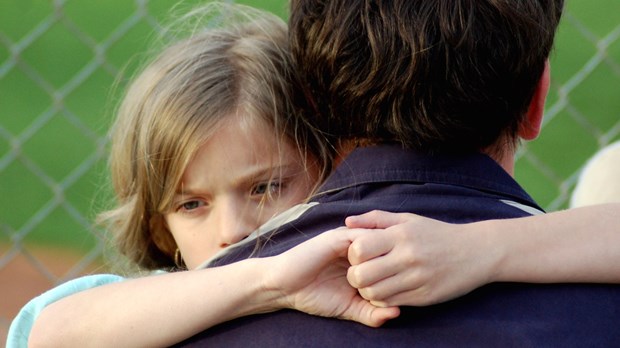
With three weeks left in our Small Talk series, I am delighted to welcome Patton Dodd, editor of OnFaith, to share his thoughts on what he has learned through his children:
One morning early this fall, my 11-year old daughter and I started listing the things we like least about each other. I cannot recall how we got to that place in the conversation, but when you're talking to Isabel, conversations can go weird places. So, for whatever reason, we were talking and one of us came upon the notion that it would be a fine time to list the key annoyances in our relationship, from our respective points of view.
After some No, you go volleying, I went first: "You talk way too fast." She really does, and the factthatshetotallygetsitfromme does not make it any less annoying. Isabel can turn your average 25-word comment into a couple blurry syllables.
"You already tell me that all the time," she said.
"Fine," I said. "You next. What annoys you about me?"
"Well," she began, great relish in her voice, "the FIRST THING is: You always have to be critical of stuff. Like, we'll be eating dinner, and everyone will be saying, 'Oh, this sauce is so good!' and even YOU'LL be saying that, but then a few moments later, you have to say, 'BUT, it could be BETTER if I had just done THIS! Or added THIS!' and then you sit there and critique it."
Yes, I do that. But I do it because I love food. I told her as much.
"Yeah," said Bel. "But you also do it with everything. Like movies." She reminded me that her mom and I had seen a movie the night before, and when she asked us how it was, we both said it was great. "But then, this morning, I walked by and you were telling Mom, 'If only they had used 3-D and an IMAX camera, it would have been SO much better!'"
I could go on, because Bel went on, making her case with a few more examples. She had me, but I argued that I was on the side of the angels. She was exaggerating the tone of those conversations, of course, but more importantly, she was misunderstanding their intent. I love food and I love movies, and talking about them is a way of loving them. (And for the record, I did not -- and would not! -- complain of a lack of 3-D or IMAX. Bel is hilarious.)
Critical engagement is sort of a family virtue, in fact. We make a habit of talking with our kids about ideas openly, and especially about the stories heard in Sunday school or sermons, books, movies and television shows, web videos and commercials. And my wife and I spend a lot of time talking about what we've seen on the internet and what we're reading and watching, so our kids are hearing it a lot even when they're not in the conversation.
That's what I went to bed thinking about the night after Bel and I shared annoyances: How fun it was to let Bel have at me, and how glad I was for the chance to tell her about how critical thinking and conversation are forms of love.
But the next day, I remembered something.
I remembered a time when I, like Bel, was 11 years old. I was hanging out with a couple friends, and we were watching "Heathcliff," a cartoon about the exploits of a street cat. Heathcliff was fighting other cats and chasing dogs and falling from the sky and landing on all fours and all that, and my friends and I were cracking up. Then, for some reason, I started in on the show: "You know, this would never really happen.... I'm not sure they should have made him do that... I wish they wouldn't use that sound effect."
What I remember most is how I ruined the show for everyone, and ruined the moment of our cartoon camaraderie. "Heathcliff" wasn't fun anymore. And I wasn't a fun friend. It got pretty awkward and stayed that way until I went home.
Bel is right. I do always have to be critical of stuff. I've always been that way. My parents weren't really like that, from what I recall, and neither was my older sister. It's just how I am. And it's not always about love -- at times, it's just about being critical.
I told Bel my "Healthcliff" story. It did not surprise her. But it made her laugh out loud, and I laughed, too.
Now, it’s not that Bel is the type of person to accept everything just as it is. I sometimes joke that she is “always looking for the upgrade”: sprinkles on her ice cream, sliced fruit in her water, a trip to Paris instead of Disney -- not that we have gone to either, but the girl likes to dream. So she wants to improve things, too, though she tends to do it by building up, not by tearing down.
I suspect that Bel’s concern—the reason my critical nature was the FIRST THING—is not just that I want to improve some things. It’s that my general air of criticism might implicate her, too. At times, I’ve no doubt given her the sense that she’s subject to critique along with everything else, that she’s not accepted just as she is. If everything in my purview needs to be tweaked, well, those in my daily purview have probably taken notice, even if subconsciously.
So I’m glad our conversation took a turn for the dangerous that day. I need to make sure those I love know I love them just as they are, especially when I’m revising everything else. Someday, perhaps we’ll all get the ultimate upgrade we’re hoping for, but in the meantime, living with the likes of Bel is upgrade enough for me.

Patton Dodd is the editor of OnFaith.
Support our work. Subscribe to CT and get one year free.
Recent Posts

"What Annoys You About Me?"
"What Annoys You About Me?"
"What Annoys You About Me?"
"What Annoys You About Me?"














